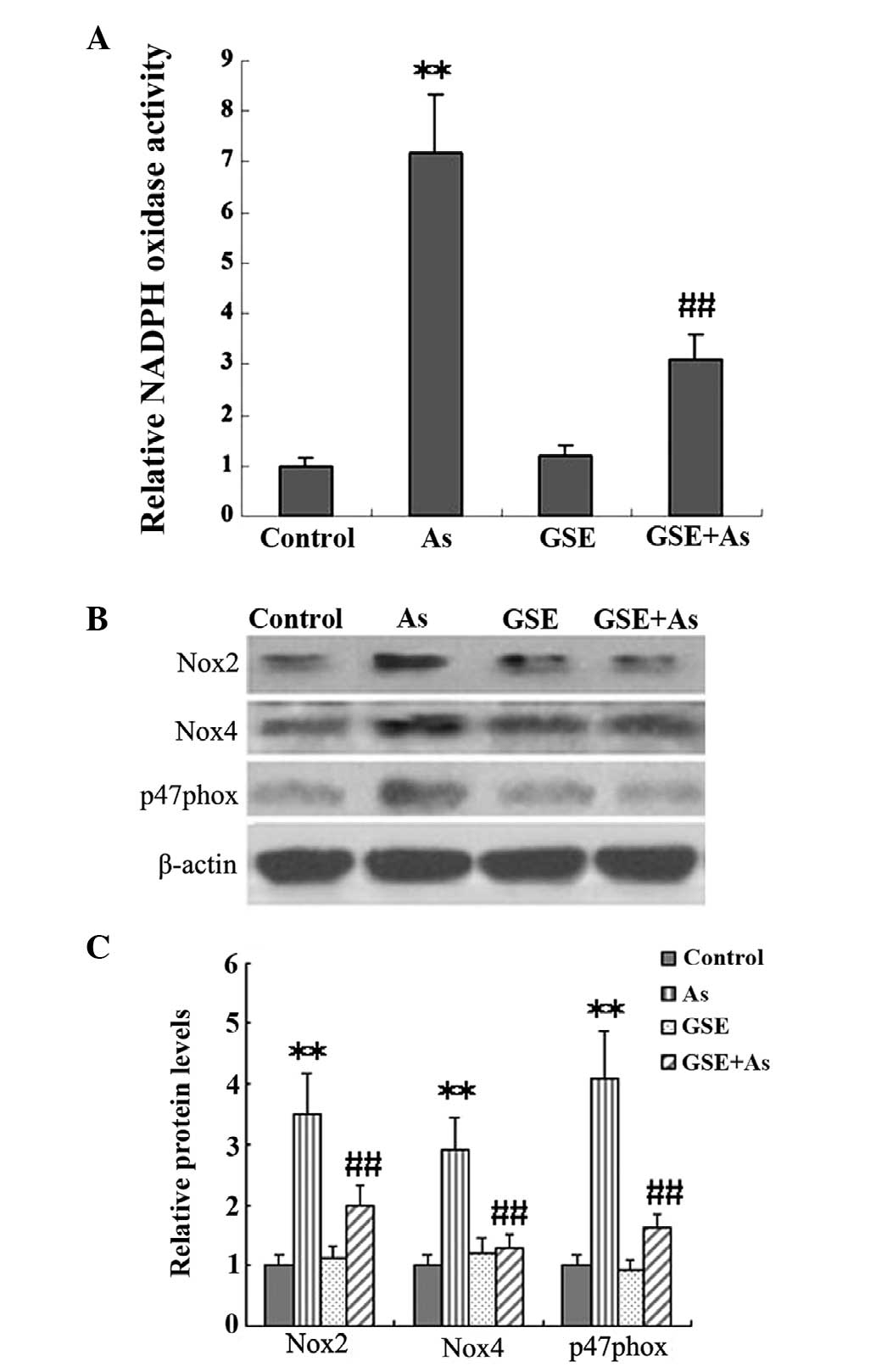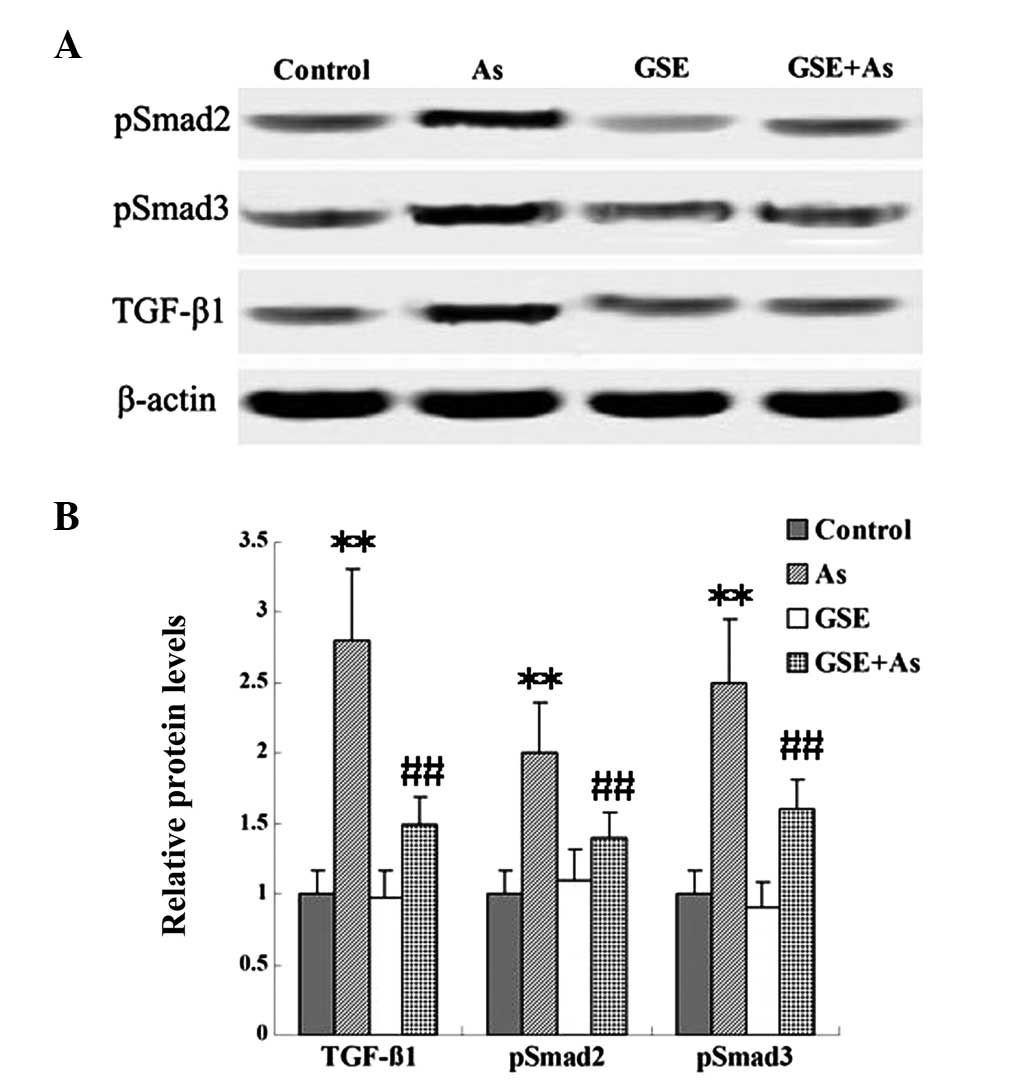|
1
|
Bao L and Shi H: Potential molecular
mechanisms for combined toxicity of arsenic and alcohol. J Inorg
Biochem. 104:1229–1233. 2010. View Article : Google Scholar : PubMed/NCBI
|
|
2
|
Eom SY, Lee YC, Yim DH, Lee CH, Kim YD,
Choi BS, Park CH, Yu SD, Kim DS, Park JD and Kim H: Effects of
low-level arsenic exposure on urinary N-acetyl-β-D-glucosaminidase
activity. Hum Exp Toxicol. 30:1885–1891. 2011.
|
|
3
|
Chen JW, Chen HY, Li WF, Liou SH, Chen CJ,
Wu JH and Wang SL: The association between total urinary arsenic
concentration and renal dysfunction in a community-based population
from central Taiwan. Chemosphere. 84:17–24. 2011. View Article : Google Scholar : PubMed/NCBI
|
|
4
|
Chen Y, Parvez F, Liu M, et al:
Association between arsenic exposure from drinking water and
proteinuria: results from the Health Effects of Arsenic
Longitudinal Study. Int J Epidemiol. 40:828–835. 2011. View Article : Google Scholar : PubMed/NCBI
|
|
5
|
Kitchin KT: Recent advances in arsenic
carcinogenesis: modes of action, animal model systems, and
methylated arsenic metabolites. Toxicol Appl Pharmacol.
172:249–261. 2001. View Article : Google Scholar
|
|
6
|
Jomova K, Jenisova Z, Feszterova M, Baros
S, Liska J, Hudecova D, Rhodes CJ and Valko M: Arsenic: toxicity,
oxidative stress and human disease. J Appl Toxicol. 31:95–107.
2011.PubMed/NCBI
|
|
7
|
Kitchin KT and Ahmad S: Oxidative stress
as a possible mode of action for arsenic carcinogenesis. Toxicol
Lett. 137:3–13. 2003. View Article : Google Scholar : PubMed/NCBI
|
|
8
|
Kitchin KT and Conolly R: Arsenic-induced
carcinogenesis - oxidative stress as a possible mode of action and
future research needs for more biologically based risk assessment.
Chem Res Toxicol. 23:327–335. 2010. View Article : Google Scholar : PubMed/NCBI
|
|
9
|
Brunati AM, Pagano MA, Bindoli A and
Rigobello MP: Thiol redox systems and protein kinases in hepatic
stellate cell regulatory processes. Free Radic Res. 44:363–378.
2010. View Article : Google Scholar : PubMed/NCBI
|
|
10
|
Samarakoon R, Overstreet JM, Higgins SP
and Higgins PJ: TGF-β1→SMAD/p53/USF2→PAI-1 transcriptional axis in
ureteral obstruction-induced renal fibrosis. Cell Tissue Res.
347:117–128. 2012.
|
|
11
|
Liu Y: Renal fibrosis: new insights into
the pathogenesis and therapeutics. Kidney Int. 69:213–217. 2006.
View Article : Google Scholar : PubMed/NCBI
|
|
12
|
Liu Y: New insights into
epithelial-mesenchymal transition in kidney fibrosis. J Am Soc
Nephrol. 21:212–222. 2010. View Article : Google Scholar : PubMed/NCBI
|
|
13
|
Derynck R and Zhang YE: Smad-dependent and
Smad-independent pathways in TGF-beta family signalling. Nature.
425:577–584. 2003. View Article : Google Scholar : PubMed/NCBI
|
|
14
|
Iwano M and Neilson EG: Mechanisms of
tubulointerstitial fibrosis. Curr Opin Nephrol Hypertens.
13:279–284. 2004. View Article : Google Scholar
|
|
15
|
Bagchi D, Bagchi M, Stohs SJ, Das DK, Ray
SD, Kuszynski CA, Joshi SS and Pruess HG: Free radicals and grape
seed proanthocyanidin extract: importance in human health and
disease prevention. Toxicology. 148:187–197. 2000. View Article : Google Scholar : PubMed/NCBI
|
|
16
|
Li WG, Zhang XY, Wu YJ and Tian X:
Anti-inflammatory effect and mechanism of proanthocyanidins from
grape seeds. Acta Pharmacol Sin. 22:1117–1120. 2001.PubMed/NCBI
|
|
17
|
Kris-Etherton PM, Lefevre M, Beecher GR,
Gross MD, Keen CL and Etherton TD: Bioactive compounds in nutrition
and health-research methodologies for establishing biological
function: the antioxidant and anti-inflammatory effects of
flavonoids on atherosclerosis. Annu Rev Nutr. 24:511–538. 2004.
View Article : Google Scholar : PubMed/NCBI
|
|
18
|
Pan X, Dai Y, Li X, Niu N, Li W, Liu F,
Zhao Y and Yu Z: Inhibition of arsenic induced-rat liver injury by
grape seed exact through suppression of NADPH oxidase and
TGF-β/Smad activation. Toxicol Appl Pharmacol. 254:323–331.
2011.PubMed/NCBI
|
|
19
|
Morris EM, Whaley-Connell AT, Thyfault JP,
Britton SL, Koch LG, Wei Y, Ibdah JA and Sowers JR: Low aerobic
capacity and high fat diet contributes to oxidative stress and
IRS-1 degradation in the kidney. Am J Nephrol. 30:112–119. 2008.
View Article : Google Scholar : PubMed/NCBI
|
|
20
|
Hu R, Wang YL, Edderkaoui M, Lugea A, Apte
MV and Pandol SJ: Ethanol augments PDGF-induced NADPH oxidase
activity and proliferation in rat pancreatic stellate cells.
Pancreatology. 7:332–340. 2007. View Article : Google Scholar : PubMed/NCBI
|
|
21
|
Draper HH and Hadley M: Malondialdehyde
determination as index of lipid peroxidation. Methods Enzymol.
186:421–431. 1990. View Article : Google Scholar : PubMed/NCBI
|
|
22
|
Levine RL, Garland D, Oliver CN, Amici A,
Climent I, Lenz AG, Ahn BW, Shaltiel S and Stadtman ER:
Determination of carbonyl content in oxidatively modified proteins.
Methods Enzymol. 186:464–478. 1990. View Article : Google Scholar : PubMed/NCBI
|
|
23
|
Barnes JL and Gorin Y: Myofibroblast
differentiation during fibrosis: role of NAD(P)H oxidases. Kidney
Int. 79:944–956. 2011. View Article : Google Scholar : PubMed/NCBI
|
|
24
|
Flora SJ, Chouhan S, Kannan GM, Mittal M
and Swarnkar H: Combined administration of taurine and monoisoamyl
DMSA protects arsenic induced oxidative injury in rats. Oxid Med
Cell Longev. 1:39–45. 2008. View Article : Google Scholar : PubMed/NCBI
|
|
25
|
Dulundu E, Ozel Y, Topaloglu U, Toklu H,
Ercan F, Gedik N and Sener G: Grape seed extract reduces oxidative
stress and fibrosis in experimental biliary obstruction. J
Gastroenterol Hepatol. 22:885–892. 2007. View Article : Google Scholar : PubMed/NCBI
|
|
26
|
Terra X, Montagut G, Bustos M, Llopiz N,
Ardèvol A, Bladé C, Fernández-Larrea J, Pujadas G, Salvadó J, Arola
L and Blay M: Grape-seed procyanidins prevent low-grade
inflammation by modulating cytokine expression in rats fed a
high-fat diet. J Nutr Biochem. 20:210–218. 2009. View Article : Google Scholar : PubMed/NCBI
|
|
27
|
Mishra D and Flora SJ: Differential
oxidative stress and DNA damage in rat brain regions and blood
following chronic arsenic exposure. Toxicol Ind Health. 24:247–256.
2008. View Article : Google Scholar : PubMed/NCBI
|
|
28
|
Bhadauria S and Flora SJ: Response of
arsenic-induced oxidative stress, DNA damage and metal imbalance to
combined administration of DMSA and monoisoamyl-DMSA during chronic
arsenic poisoning in rats. Cell Biol Toxicol. 23:91–104. 2007.
View Article : Google Scholar : PubMed/NCBI
|
|
29
|
Nandi D, Patra RC and Swarup D: Oxidative
stress indices and plasma biochemical parameters during oral
exposure to arsenic in rats. Food Chem Toxicol. 44:1579–1584. 2006.
View Article : Google Scholar : PubMed/NCBI
|
|
30
|
Suzuki S, Arnold LL, Pennington KL,
Kakiuchi-Kiyota S and Cohen SM: Effects of co-administration of
dietary sodium arsenite and an NADPH oxidase inhibitor on the rat
bladder epithelium. Toxicology. 261:41–46. 2009. View Article : Google Scholar : PubMed/NCBI
|
|
31
|
Straub AC, Clark KA, Ross MA, Chandra AG,
Li S, Gao X, Pagano PJ, Stolz DB and Barchowsky A:
Arsenic-stimulated liver sinusoidal capillarization in mice
requires NADPH oxidase-generated superoxide. J Clin Invest.
118:3980–3989. 2008. View
Article : Google Scholar : PubMed/NCBI
|
|
32
|
Okuda S, Languino LR, Ruoslahti E and
Border WA: Elevated expression of transforming growth factor-beta
and proteoglycan production in experimental glomerulonephritis:
Possible role in expansion of the mesangial extracellular matrix. J
Clin Invest. 86:453–462. 1990. View Article : Google Scholar
|
|
33
|
Gaedeke J, Peters H, Noble NA and Border
WA: Angiotensin II, TGF-beta, and renal fibrosis. Contrib Nephrol.
135:153–160. 2001. View Article : Google Scholar : PubMed/NCBI
|
|
34
|
Bondi CD, Manickam N, Lee DY, Block K,
Gorin Y, Abboud HE and Barnes JL: NAD(P)H oxidase mediates
TGF-beta1-induced activation of kidney myofibroblasts. J Am Soc
Nephrol. 21:93–102. 2010. View Article : Google Scholar : PubMed/NCBI
|
|
35
|
Okada H, Danoff TM, Kalluri R and Neilson
EG: Early role of Fsp1 in epithelial-mesenchymal transformation. Am
J Physiol. 273:F563–F574. 1997.PubMed/NCBI
|
|
36
|
Fan JM, Ng YY, Hill PA, Nikolic-Paterson
DJ, Mu W, Atkins RC and Lan HY: Transforming growth factor beta
regulates tubular epithelial-myofibroblast transdifferentiation in
vitro. Kidney Int. 56:455–1467. 1999.PubMed/NCBI
|
|
37
|
Attisano L and Wrana JL: Signal
transduction by the TGF-beta superfamily. Science. 296:1646–1647.
2002. View Article : Google Scholar : PubMed/NCBI
|
|
38
|
Schnaper HW, Hayashida T and Poncelet AC:
It’s a Smad world: Regulation of TGF-beta signaling in the kidney.
J Am Soc Nephrol. 13:1126–1128. 2002.
|

















